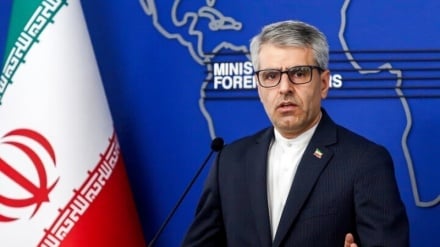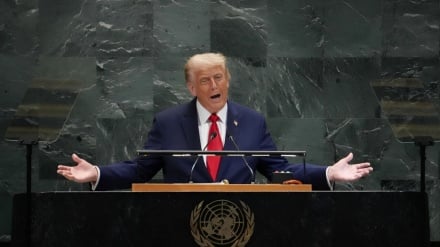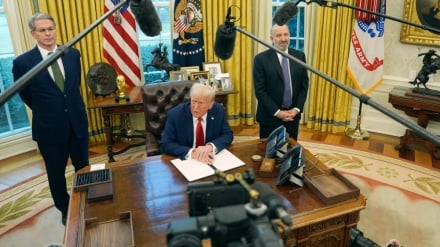In wake of Venezuela coup fiasco, US military threats mount
One week after the abortive coup launched by Juan Guaidó, the US-funded and self-proclaimed “interim president” of Venezuela, Washington has stepped up its threats of a direct US military intervention.
Bill Van Auken, a politician and activist who was a presidential candidate in the U.S. presidential election of 2004, has more in this article.
Appearing on ABC’s “This Week” news talk show, US Secretary of State Mike Pompeo insisted that President Donald Trump has the power to order an invasion of Venezuela without US congressional authorization.
Pompeo told ABC “The president has his full range of Article 2 authorities, and I’m very confident that any action we took in Venezuela would be lawful”.
Pompeo said “Make no mistake, we have a full range of options that we’re preparing for”. “Diplomatic options, political options, options with our allies, and then ultimately, a set of options that would involve use of US military. We’re preparing those for him [Trump] so that when the situation arises, we’re not flat-footed.”
The US state secretary’s threats follow a Pentagon meeting in which Admiral Craig Faller, the chief of the US Southern Command (SOUTHCOM), which directs US military operations in Latin America and the Caribbean, was flown to Washington to brief top administration officials, including the secretary of state and national security adviser John Bolton, both principal architects of the Venezuelan regime change operation.
Afterwards, Trump’s acting defense secretary, Patrick Shanahan, told Pentagon reporters, “We have a comprehensive set of options tailored to certain conditions and I’m just going to leave it at that.”
When a reporter pressed as to whether the options under discussion included an invasion of Venezuela, Shanahan replied, “I’ll leave that to your imagination. All options are on the table.”
Meanwhile, Guaidó told the BBC that he was seriously considering asking the US to launch a military intervention as the only means of placing him in the Miraflores presidential palace.
Asked about the US “military option,” Guaidó said he would “evaluate all options,” adding that it was “responsible to evaluate” the prospects of an armed US invasion of Venezuela, and that, “I, as president in charge of the national parliament, will evaluate all options as necessary.”
On the one hand, one has in Pompeo, Bolton and other imperialist thugs insisting that a war of aggression to enforce US regime change in a Latin American nation is “lawful.” On the other, there is the exposure of the supposed champion of democracy in Venezuela, Guaidó, as a shameless stooge of Washington, prepared to invite US troops to invade the country.
Guaidó’s mulling over the feasibility of a US invasion follows the abject failure of the recent coup attempt, in which he appeared together with the leader of his extreme right-wing Voluntad Popular party, Leopoldo Lopez, who had been under house arrest for his part in previous acts of violence, as well as a few dozen armed men in uniforms, outside of the La Carlota air base in eastern Caracas.
His call there for the military to rise up and overthrow the government of President Nicolas Maduro failed to evoke any serious split in the armed forces, just as his appeal to the Venezuelan people to storm the air base evoked little, if any, popular support. Nonetheless, the attempt demonstrated the readiness of the forces behind Guaidó, no doubt including CIA-trained mercenaries, to carry out extreme violence, as heavily armed civilians set up machine-gun positions on an overpass near the targeted air base.
The failure of the recent coup attempt was followed by an even more dismal turnout for the right-wing opposition, when Guaidó’s call for Venezuelans to march on military bases and appeal to the armed forces to revolt brought out a few hundred people at best, while soldiers approached by the rightists burned leaflets they were handed.
Meanwhile, there has been a flurry of US-Russia discussions over Venezuela, beginning with a 90-minute phone conversation between Trump and Vladimir Putin, followed by a meeting between Pompeo and his Russian counterpart Sergei Lavrov in Finland on Monday. Having blustered the day before in his ABC interview that the “Russians must get out” of Venezuela, Pompeo appeared smiling with Lavrov following their talk.
Guaidó, meanwhile, has insisted that, while the recent coup attempt failed, a new military uprising could be coming. He told the AFP in Caracas, “There were people who failed to follow through,” claiming that “it doesn’t mean that they won’t do it soon … We are very close to achieving change in Venezuela.”
There are historical precedents for abortive coups being followed by the real thing later on. Such was the case in Chile in June 1973, when a lieutenant colonel led a column of tanks against the presidential palace, the so called tanquetazo revolt against the Popular Unity government of President Salvador Allende, which was quickly put down. The failed attempt, however, proved a dress rehearsal for the successful coup led by General Augusto Pinochet in September1973. It was used to gauge the reaction of the military, the government and the working class organizations. Pinochet ruled the country with a fascist-military dictatorship for the next 16 years.
A military revolt to overthrow the Maduro government could provoke a bloody civil war in Venezuela. Its success would undoubtedly impose a savage dictatorship, joining sections of the armed forces with the country’s traditional right-wing oligarchy and US imperialism.
The US stooge, Guaidó, has already spelled out the economic and social objectives of this regime in his so-called “Plan Pais,” which calls for the privatization of Venezuela’s oil reserves, the largest on the planet, and handing them over to the US-based energy conglomerates, starvation wages and the complete subordination of the country’s economy to the austerity adjustment plans of the IMF. Such policies can be implemented only by means of police-state repression.
The Venezuelan people should not rely only upon the Maduro government nor the high command of the country’s military to defeat the conspiracies of Washington and its puppet Guaidó. They should act more seriously against the capitalist order led by Washington, and the interests of those banks and transnationals, such as Chevron and Halliburton, while workers have seen their living standards decimated.
The progressive answer to the increasingly dangerous crisis unfolding in Venezuela lies in the independent political intervention of the people in preserving the country’s vast oil wealth under popular control.
EA


